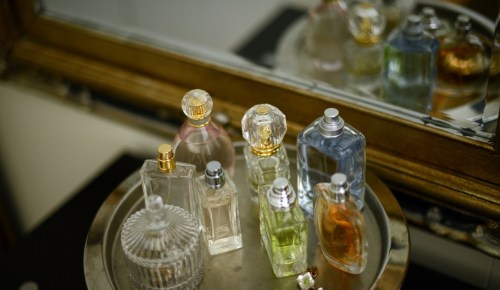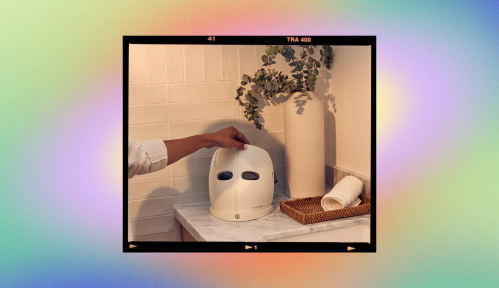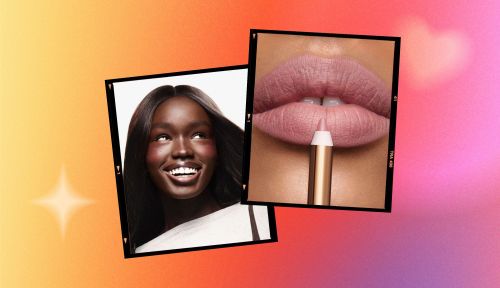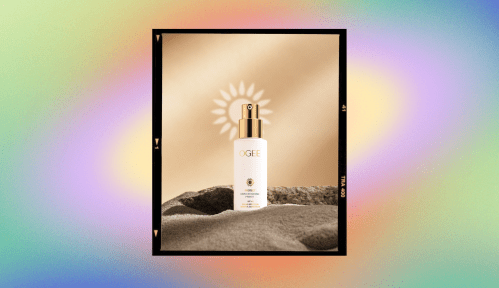4 Ways To Keep Your Expensive Fragrances Smelling Fresh for as Long as Humanly Possible
Learn from beauty and fragrance experts about how to make the scents in those beautiful bottles on your bedside table last longer.

Gone are the days of committing exclusively to a single signature scent. Collecting fragrances has become the norm, and allows you to change up your smell as frequently as you change your look. In the same way you swap out your clothes every season, you can swap a deep, musky fragrance you’d sport in the winter for a lighter, breezier scent in the warmer months to completely transform your vibe. And it’s understandable to want to collect fragrances; scent plays a powerful role in forming and triggering memories and emotions, and a collection of sculptural, striking bottles makes a great decor piece. But once you commit to amassing a stockpile of scents, how do you make them last as long as possible?
Experts in This Article
national beauty director at Nordstrom
co-founder of boutique fragrance consulting company Serendipitee NYC
director of operations at The Institute for Art and Olfaction
beauty director at Sephora
co-founder of boutique fragrance consulting company Serendipitee NYC
Keep reading for what you need to know.
Do fragrances expire?
Though fragrances don’t technically expire, they do have a shelf life. Similar to food freshness labels you’d see at the grocery store, this number refers to how long a consumer can expect a scent to be at its maximum strength. Nordstrom National Beauty Director, Autumne West, says that all fragrances have a period after opening (PAO) number on the box or in the packaging insert. The symbol, which looks like an open jar with a number and “+M,” represents the number of months a brand expects its fragrance to smell its best once opened.
She says those numbers vary by scent and brand, but that they’re generally about 24 months. Fragrances without preservatives may have a shorter shelf-life. The further you get away from the PAO, the more you risk the scent losing its potency and staying power. And while using a scent after its shelf life probably won’t cause harm, the scent may fade and not be as strong. “Over time the scent will change and I don’t think you’ll enjoy the smell on yourself anymore,” says West. If your collection is a functional one that involves you wearing the scents you collect, the answer to avoiding this is to make sure you wear your fragrances and use them up.
However, Minetta Rogers, Director of Operations at The Institute for Art and Olfaction, notes that this labeling isn’t standard in vintage bottles and that the PAO can be nuanced and varied. She mentions that she has some bottles far past their PAO that smell identical to when she first opened them, so it may depend on the scent itself and storage conditions, too. She also advises against throwing away perfumes that have reached their PAO without examining them first; however, each scent is individual, so you should check your bottles to see if the appearance and smell have changed drastically and are no longer to your liking.
4 tips from fragrance experts to make scents last longer
As far as making your fragrances last goes, let’s start with what not to do. “If you wanted to imagine a perfume collection that deteriorated the most over a short amount of time, you would place a perfume collection of citrus and other top-note heavy perfumes in constant direct sunlight in a humid room that experienced extreme temperature variation,” says Rogers. “Possibly the collection would constantly be jiggling to add kinetic energy to the mix—imagine a perfume collection in direct sunlight on top of an old washing machine on full spin cycle.”
But if your aim is to build a perfume wardrobe that’ll help you express yourself throughout the year and with different scents, there are ways to ensure your fragrances stay fresh for as long as possible.
1. Store them in cool, dry places
According to all the experts interviewed, the worst thing you can do for a fragrance’s shelf life is to store it in a spot where the temperature fluctuates (looking at you, medicine cabinet). The temperature fluctuations and moisture in rooms with a lot of temperature variability, like a bathroom, can cause perfume to evaporate over time. Instead, aim for a cool, dry place to keep fragrances at their best.
2. Store them away from direct sunlight
A tray of glittering glass bottles shining in the sun makes for a great photo, but according to West, exposure to direct sunlight can “change the look and color of the liquid, fade the bottle, and potentially impact the scent itself.” More opaque bottles that allow less light in may help scents last a little longer, but your best bet is to keep all your scents stored away from the sun.
3. Buy scents with longer-lasting notes
According to Rogers and Myiesha Sewell, Beauty Director at Sephora, certain fragrance families last longer than others on the skin and in the bottle. In general, fragrances heavy on citrus tend to have a shorter shelf life in the bottle (and, FWIW, on the skin) than more rich gourmand scents that contain creamy notes like vanilla and spices.
A bit about composition: Fragrances are composed of three levels of notes: top, heart, and base notes. The top notes are the first impression of a scent, the heart is its essence, and the base is generally what you’re left with when the rest of the fragrance fades.
Rogers adds that “top notes turn more quickly than heart or base notes,” and that not all perfumes use this specific composition structure. The scents of fragrances heavy on top notes, like fresh citrus or aldehydes (the synthetic components that give many scents that fresh, clean scent) won’t stay as pungent and may fade over time faster than ones with more heart and base notes (which tend to be rich, strongly-scented notes) comprising the scent.
4. Start with a smaller collection
There is no magic number for how many fragrances one should own, but if your goal is to actually wear all of them, starting with a smaller collection makes more sense than amassing a larger quantity. If you want to get more variety, you can layer scents together.
Tami Katz and Kathryn Balcerski, cofounders of the boutique fragrance consulting company Serendipitee NYC, say that someone who genuinely wants to wear many scents would benefit from buying smaller sizes so they can be layered and used. Experiment with layering scents by testing out combinations that share similar notes and would stack together well, and intensify existing scents you love already by putting on a matching body wash or lotion that carries the same scent.
Rogers says the best way to enjoy your perfume collection is to use it because “it is an inherently time-based craft and art.” She advises letting your “individual, idiosyncratic desires and preferences for certain fragrance materials” guide your collecting, rather than the pure functionality of a scent’s shelf-life.
Sign up for the Well+Good SHOP Newsletter
Get exclusive deals on wellness, beauty, fitness, and food products that have been hand-picked by our editors.
Got it, you've been added to our email list.










